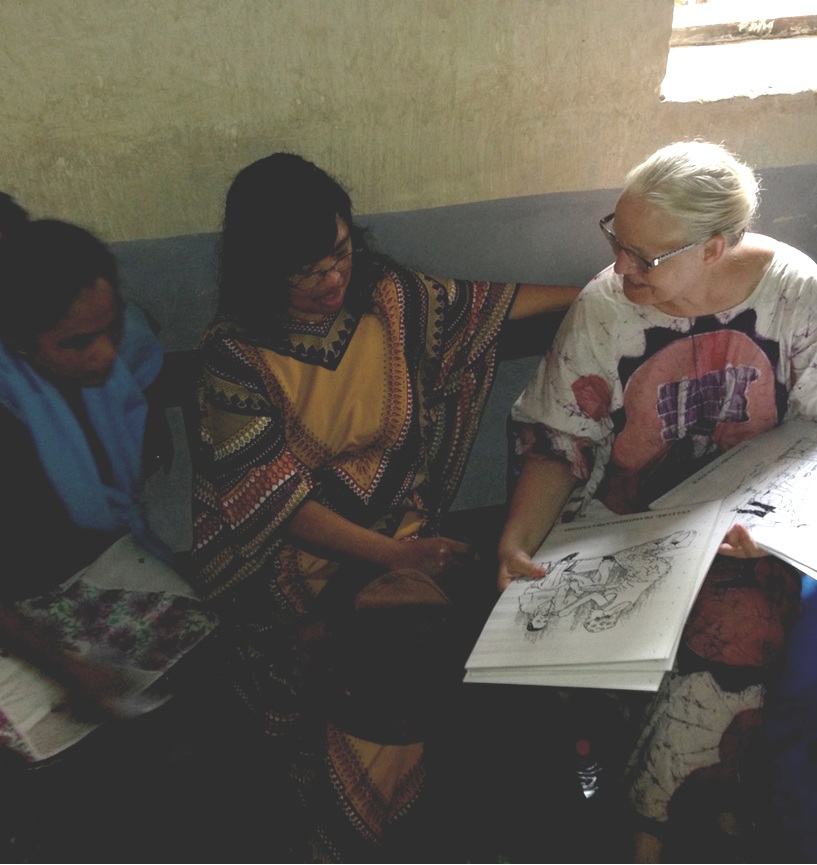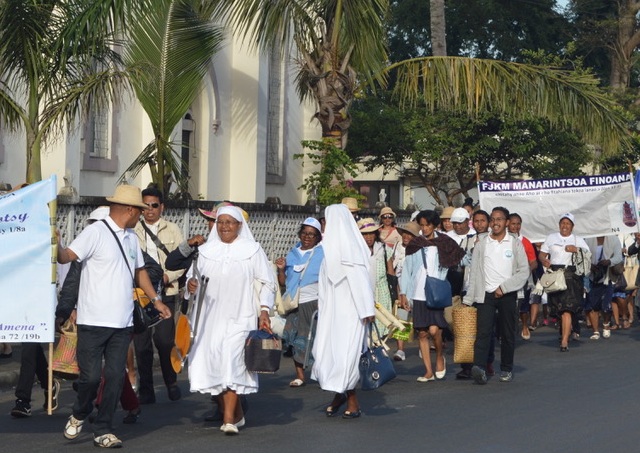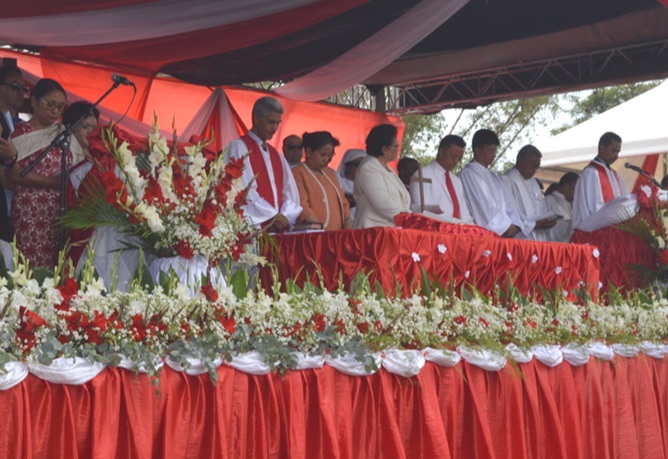Doug Tilton - March 2019 Update
Regional Liaison for Southern Africa
Dear friends,
It is hard to believe that 2019 is already here, shouldering out what turned out to be a very full 2018. Thank you for your prayers, your notes of interest and encouragement, and your generous gifts that have enabled me to accompany the wonderful work being done by our partners and mission personnel in Southern Africa.
The past year has featured a significant amount of travel. It has been a joy to be able to spend time with colleagues at the Church of Jesus Christ in Madagascar (FJKM) on two occasions in 2018. In April I had the privilege of traveling part of the time with a group from Fifth Avenue Presbyterian Church in New York City. Fifth Ave PC has a number of people of Malagasy heritage in the congregation and it has long been involved in supporting the work of the FJKM.
We had opportunities to visit the new FJKM Fruit Center at Mahatsinjo which will enable farmers to grow improved varieties of fruit, particularly mangos, that are more marketable. We also heard from FJKM seminary students who had done field research on critical social issues such as trafficking, migration, and gender-based violence at various locations around the island so that they are better equipped to help communities to address these concerns in their ministries. Both are FJKM initiatives that Fifth Ave PC has helped to support.
Together with Christi Boyd, the PC(USA) Regional Facilitator for Women’s and Children’s Interests, and Pastor Helivao Poget, the head of the FJKM’s Chaplaincy to Marginalized People (which organizes the seminary field research trips), I had an opportunity to visit one of the field research sites at Ampasamadinka, just south of Madagascar’s second largest city, Toamasina, on the east coast. The local FJKM minister, Pastor Tsoa – himself a recent seminary graduate and a beneficiary of the course – and members of his congregations helped us to understand some of the hazards for their community of being a popular overnight stop for long-distance truckers.
Christi and I also had a chance to spend some time with members of the FJKM Women’s Association, Dorkasy, at a regional gathering in the small town of Mahabako in the southeast. Christi shared with the roughly 250 women gathered there about how our partners in the Democratic Republic of Congo are responding to domestic violence concerns.
I returned to Madagascar in August to take part in the FJKM’s Jubilee, celebrating the church’s 50 years as a denomination and the 200th anniversary of the arrival of Christian missionaries from the former London Missionary Society. About 15,000 people attended the weekend of celebrations at Toamasina, near the missionaries’ original landing site. An exhibition area showcased the FJKM’s extensive and diverse ministries including the work of the churchwide committee on HIV and AIDS, which had set up a tent for voluntary testing and counseling. Pastor Ammi Irako Andriamahazosoa, the President of the FJKM, set a wonderful example by being the first head of a denomination to be publicly tested for HIV.
The FJKM Jubilee also provided an opportunity to talk with church officials, including the head of the Schools Department – which runs more than 700 primary and secondary schools around the country – about the FJKM’s exploration of new teaching techniques, known as “Evidence Based Methods of Instruction” (EBMI), which they have been piloting. We heard that test scores in the classrooms that have been trying out the new teaching methods have had phenomenal success, with students’ scores on national exams jumping from around 65% on average to more than 90% in the pilot classes. The FJKM was very happy with the results and has made a commitment to incorporating the methods into the Schools Department’s future program, including teacher training.
I also made two very contrasting visits to partners in Zimbabwe this year. In February I found people to be cautiously optimistic. Robert Mugabe, the 93-year-old head of government since Zimbabwe regained independence in 1980, had been toppled by the military in November 2017, and Zimbabweans were looking forward to political and economic change after years of decline. I completed a tour, begun two years ago, of all of the congregations of the Harare Synod of Church of Central Africa Presbyterian (CCAP), one of our two church partners in Zimbabwe. I was humbled by the hospitality shown to me by congregations that were really struggling in the face of 90%+ unemployment and an almost complete lack of cash. But I was also inspired by the faithfulness and creativity demonstrated by our partners as they ministered to hurting communities.
My second visit was in August shortly after national elections on July 30. Emmerson Mnangagwa, Mugabe’s former Vice President, had defeated Movement for Democratic Change leader Nelson Chamisa, despite the latter’s attempts to challenge the official result in court. In the days after the election, the security forces had fired on crowds protesting the official results, killing six. The mood in Harare was one of frustration and resignation, and much of the hopeful optimism I had found in February had dissipated. I had an opportunity to meet the General Secretary of the Zimbabwe Council of Churches, Dr. Kenneth Mtata, who was hoping to encourage the new government to form a government that included opposition voices, but so far these efforts have met with little success.
On January 11th in an effort to curtail demand for imports, the government announced a 150% increase in the price of fuel to roughly $12.50 per gallon, giving Zimbabwe one of the highest fuel prices in the world. The following Monday, as soaring fuel costs drove up the prices of other basic commodities, the country’s major urban areas erupted in protests. Zimbabwe’s main labor federation called for a national “stay-away.” At least a dozen protesters were reported to have died in clashes with police, and dozens more were injured. Police reportedly conducted house-to-house searches for people believed to have been involved in the demonstrations, with up to 700 people detained and a number of women reporting rape. Amnesty International documented “a systematic pattern of human rights violations, including restrictions on public assembly, excessive use of force, arbitrary arrests, and internet shutdown by the security forces.”
Madagascar, too, faced a highly contentious election at the end of 2018, one which pitted former President Marc Ravalomanana, who was deposed by a military coup d’état in March 2009, against Andry Rajoelina, the civilian leader of the “transitional authority” that was installed by the coup. On January 8th Madagascar’s High Constitutional Court certified Rajoelina’s victory. The new government will need to work hard to root out corruption and to rebuild the economy which suffered greatly in the aftermath of the coup. Both Madagascar and Zimbabwe need your prayers for justice, peace, and prosperity.
Other highlights of 2018 included:
• an opportunity to take part in the General Assembly of the Uniting Presbyterian Church in Southern Africa near Johannesburg in July;
• a chance to observe a training of trainers workshop that the Lesotho Evangelical Church in Southern Africa organized in Morija, Lesotho, as the church renews its efforts to combat HIV and AIDS in a nation with the world’s second highest HIV infection rate;
• a visit to leaders of the Presbyterian Church of Mozambique in Maputo;
• my 35th class reunion at Macalester College in St. Paul, MN; and
• a three-month period of interpretation in the U.S.A. (September-November) when I had a chance to visit more than a dozen congregations and participate in a meeting (and an Advocacy Day in Washington, DC) organized by the Congo Mission Network.
Thank you for your support of my ministry over the past year and for all that you do to sustain the mission and witness of Presbyterians and global partners, locally, nationally and internationally. I am grateful for the opportunity to be a part of a community working together for justice, peace and abundance of life for all God’s people.
Grace and peace,
Doug Tilton
Read more about Doug Tilton’s ministry HERE.
THE NEED
The Outreach Foundation is seeking $10,000 for support funds for Doug Tilton and $20,000 annually for pastor and evangelist training, fruit, vegetable and environmental education (FVEE), and HIV/AIDS prevention in Madagascar.



